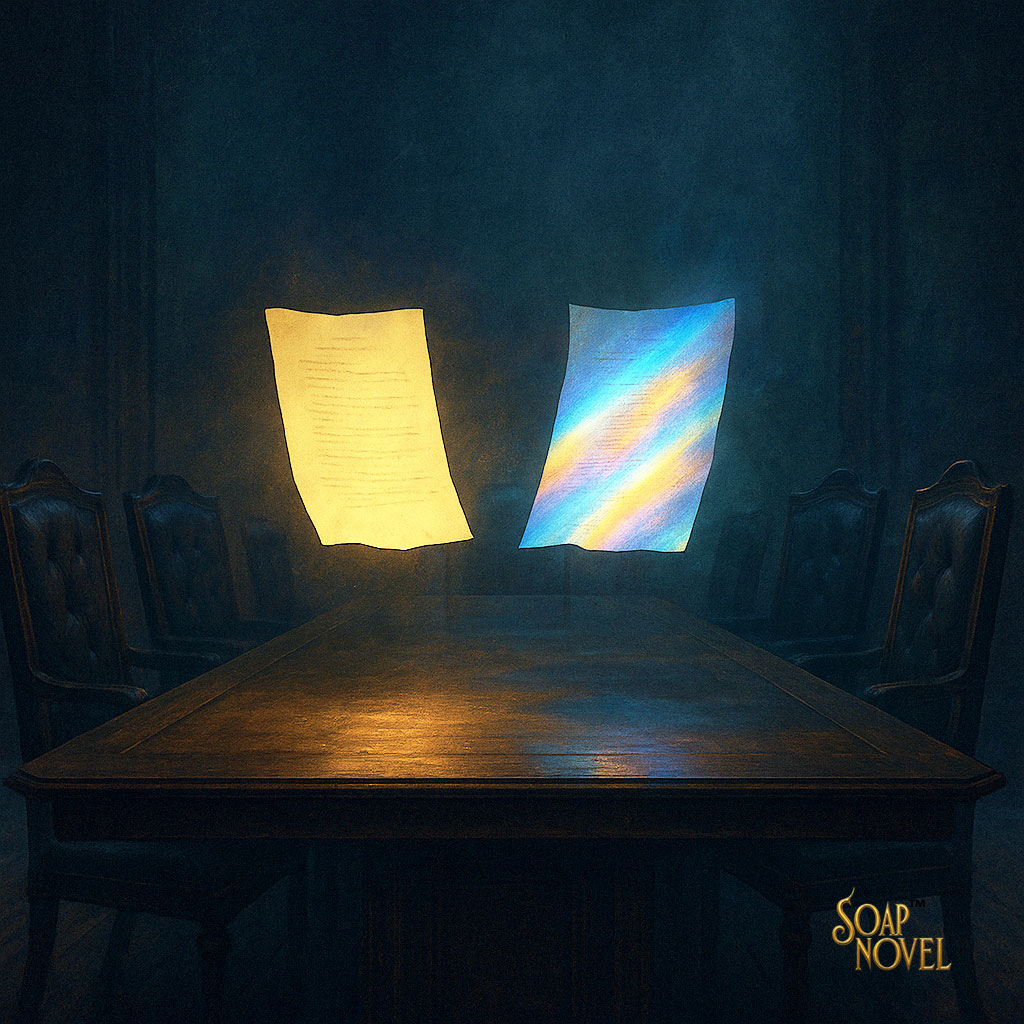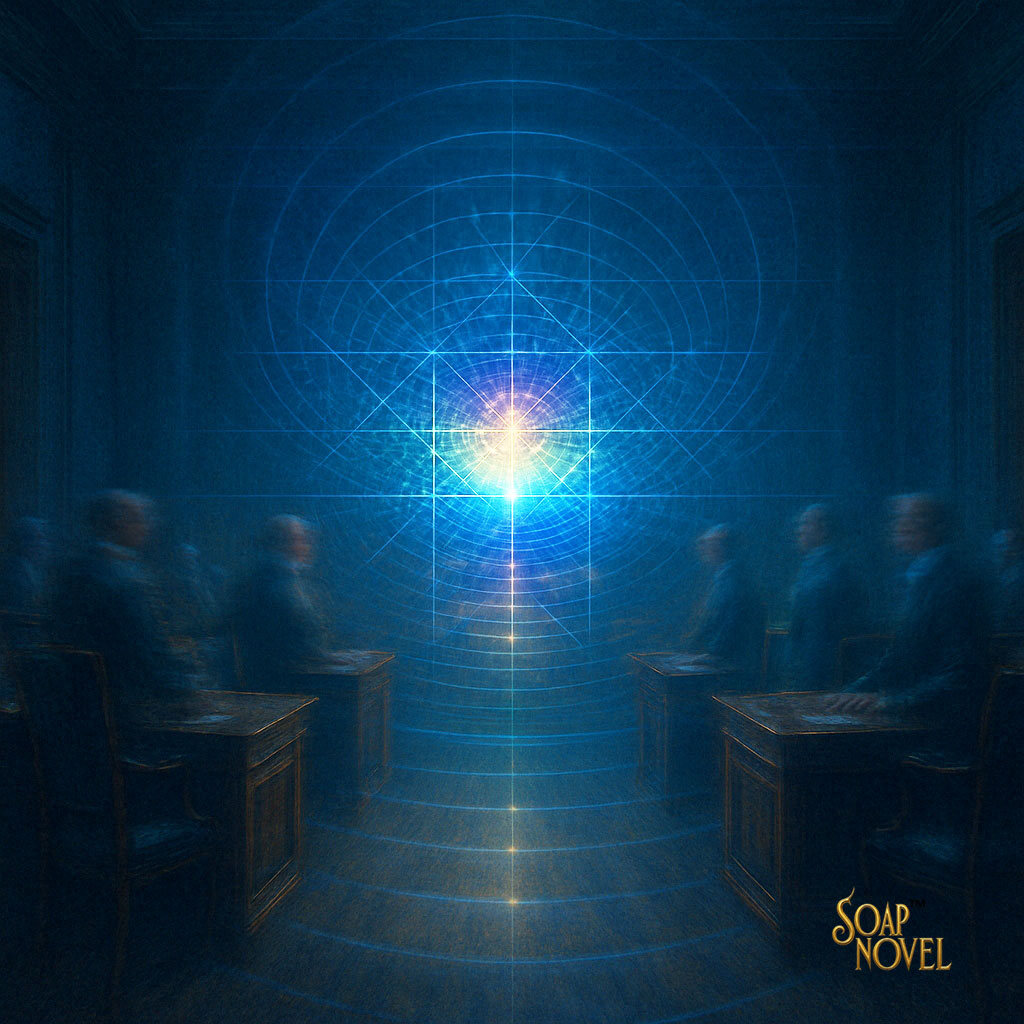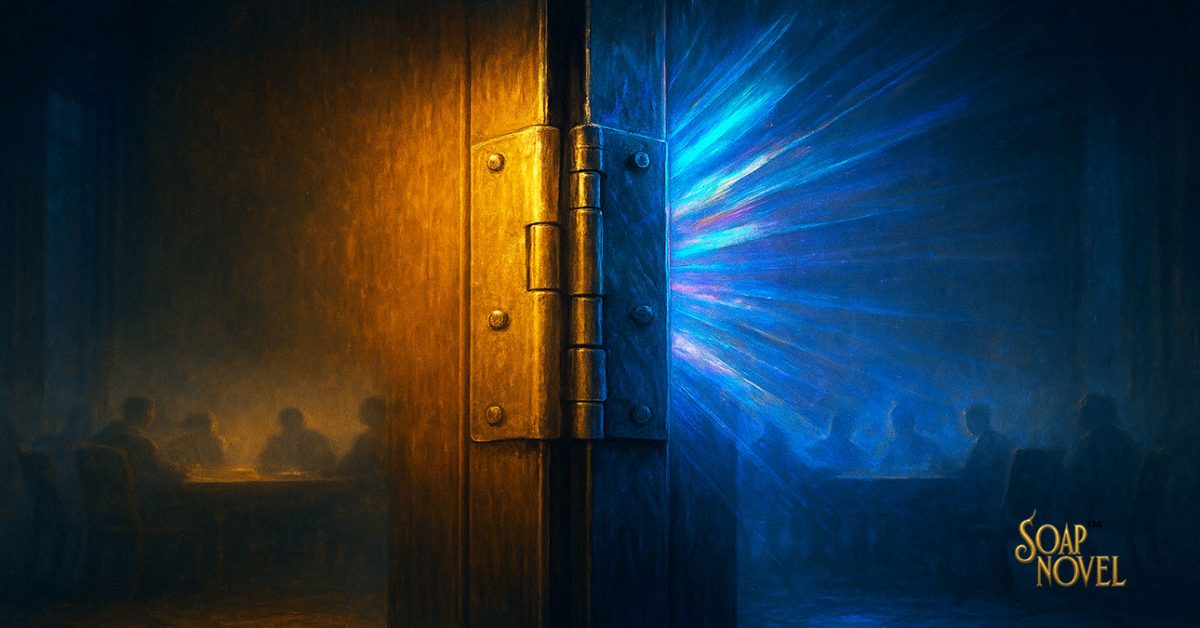Corridor Prelude
First-time here? Start at Chaptisode 1
Published: October 7, 2025 SAST. UTC +2
The corridor was unusually quiet. Even the walls seemed to hold their breath. Light no longer poured steady and amber from the fixtures overhead but flickered in shards — prisms splitting, reforming, then vanishing into shadows that stretched longer than the hallway itself.
Whispers had once carried as a single chord, the resonance of something unseen arranging itself into unity. But now the sound fractured. Notes broke against one another, scraping rather than merging. Dissonance had entered the chamber.
The hinge creaked, faint but persistent. A symbol in wood and steel that spoke louder than the assembled voices it held apart. The Protocol, which had once whispered in careful synchrony, was no longer sure of itself.
The Pretoria Draft Denied
Within the cabinet room, ministers passed around two sheets that claimed the same authorship.
One draft glowed with the familiar weight of amber ink: the “official” statement of Pretoria, careful and tempered, words selected as if each had been sanded smooth.
The other came as a reflection — the same draft, but light refracted through some invisible prism. It was sharper, words edged with urgency, phrases knifing past diplomacy into unmasked intent.
Both drafts carried the same seal. Both bore the same date. Yet each denied the other’s existence.
“The official version is before you,” one minister insisted, tapping the amber draft with two fingers.
“And yet this version exists,” another replied, holding up the prismatic twin. “Who among us authored it?”
The chamber rustled with unease. No one admitted to penning either, though all agreed both had been read.

The Split in the Hinge
When Ramaphosa entered, the hinge itself betrayed the chamber. One side of the double doors swung open with grace; the other resisted, groaning against its frame until aides shoved it wider.
Inside, the president paused at the table’s head. His voice bore a cadence not entirely his own — the TrumpaPhosa Protocol bleeding into his timbre.
“We are not here to debate drafts,” he said. “We are here to decide which draft is true.”
That declaration snapped the room in two.
Alpha branch ministers urged restraint: let the draft remain as amber; let our words lean on diplomacy, cautiously arranged, careful not to provoke.
Beta branch ministers pressed urgency: adopt the prismatic draft; issue clarity, even if confrontational; show the world the Window Act is already being written.
Each argument reverberated into the corridors, echoes layering upon echoes until the walls themselves seemed to disagree.
N’Djamena Cell Report
The cabinet had barely begun its divided debate when an aide slipped in, sliding a report down the table.
From Chad. From N’Djamena.
A containment cell had registered anomaly. Not destruction — containment. The echo pattern matched the Pretoria drafts, as if the cell itself had been seeded with the leak.
No explanation existed for how a classified draft could resonate inside a secure chamber thousands of kilometers away. Unless someone had placed it there.
The phrasing in the report was careful: containment > destruction. Someone had decided the anomaly must be preserved, not erased.
The ministers fell silent, both Alpha and Beta momentarily bridged by a shared unease.
Border Council Whispers
The silence fractured again with whispers about Eritrea. About Djibouti. About a “Border Council” forming in shadow.
It was not yet official, not yet acknowledged, but its existence was undeniable.
Border-first doctrine. Ground defense before air. Eritrean garrisons readied. Djiboutian ports spoken of as staging grounds.
One minister leaned forward, voice taut: “If this council is real, then the border itself has already become the hinge. We are deciding nothing here; the doors are being forced elsewhere.”
But Alpha ministers cautioned against lending reality to rumor. To speak of the Border Council too loudly was to conjure it into being.
G7 in the Fields
Beyond Africa, the G7 delegation walked the continent’s fields under the guise of agricultural survey. Clipboards and soil samples, boots heavy in mud, smiles rehearsed.
But ministers read the reports differently. The “surveys” catalogued not just crops but supply chains: fuel lines, transport hubs, export bottlenecks.
“They audit us,” one Beta voice said, “as if the continent is inventory for their shelves.”
Alpha countered: “Better audit than embargo. If they audit, they at least acknowledge our existence.”
Yet beneath both perspectives, suspicion grew that the G7’s real harvest was data — and data was leverage.
Kenya Manifest Leak
The leak from the United Nations smoldered next.
A manifest: relocation logistics for staff into Kenya.
The document suggested a humanitarian pivot — Nairobi as hub for efficiency and response. Yet threaded through the manifest were containment protocols: restricted corridors, coded clearances, secured enclaves.
The split widened.
- Alpha called it necessary modernization.
- Beta branded it recolonization in softer clothes.
Whichever was true, both sides agreed the leak itself was not accidental. Someone wanted the division deepened.
The Spectrum Test
As the chamber bled debate, the spectrum registered its test.
A faint pattern across the frequencies, not strong enough to be broadcast, but distinct enough to be logged. A test image without picture — only lines, a faint lattice across perception itself.
Alpha ordered halt.
Beta demanded proceed.
Go. No-go.
Two orders issued in the same instant.
The Protocol intervened.

The Coherence Pulse
The chamber froze under the weight of a ninety-second coherence pulse.
Every minister stilled, voices caught between syllables. The spectrum lattice shone, prismatic and brief.
For ninety seconds, Alpha and Beta ceased to matter. There was only the pulse, binding and unbinding simultaneously.
At second ninety-one, the light collapsed back to amber.
Ministers blinked, looked at their notes, and realized none of them agreed on what had just been decided.
Closing Corridor
The corridor beyond the chamber held prismatic light for exactly three seconds before vanishing back to amber glow.
Aides whispered that the hinge had creaked louder this time, as if straining under its own fracture.
No one could confirm whether a decision had been made. Yet all felt its weight as if it already existed.
The closing line hung unspoken, but each minister thought it, privately, silently, as though the words had drafted themselves:
The hinge had not closed — it had split, and in its fracture lay the first draft of the Window Act.
If this story resonates with you, consider supporting the protocol with a small Bitcoin donation. Every satoshi counts in keeping the signal strong—share and enjoy!
You’re reading Anomaly State — a serialized political fiction saga.
🔗 Bitcoin Address: 3NM7AAdxxaJ7jUhZ2nyfgcheWkrquvCzRm
© 2025 SoapNovel Studios — Part of the SoapVerse Network. All rights reserved. 版权所有
This serialized work is protected under creative content provisions and monitored by the Protocol.
Registered for satirical transmission worldwide.
English
You’re reading Anomaly State — a serialized political fiction saga.
Although satirical and fictional, TrumpaPhosa carries a thread of purposeful prophecy and hidden revelation. Some readers may interpret it as a roadmap — a reflection of what is, what was, and what may yet come.
Zulu (isiZulu)
Ufunda Anomaly State — uchungechunge lwenganekwane yezepolitiki.
Nakuba kungukuhleka nokuyinganekwane, iTrumpaPhosa ithwala umqondo wokuphrofetha ngenhloso kanye nokudalulwa okufihlekile. Abanye abafundi bangakuhumusha njengemephu yomgwaqo — ukubonakaliswa kwalokho okukhona, okwedlule, nokungenzeka kusasa.

